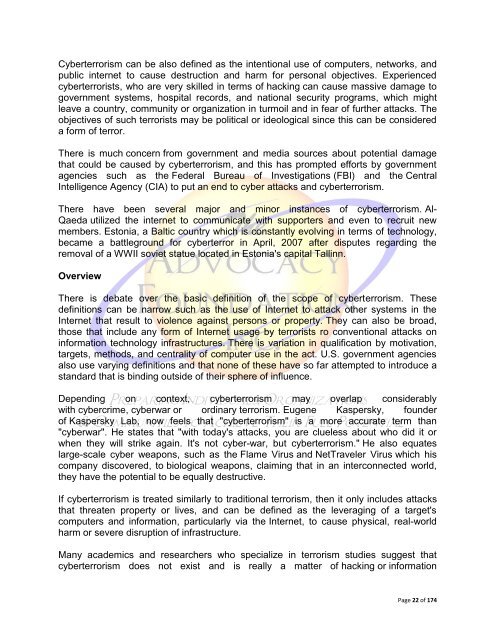International Cyber Terrorism
International Cyber Terrorism
International Cyber Terrorism
- No tags were found...
You also want an ePaper? Increase the reach of your titles
YUMPU automatically turns print PDFs into web optimized ePapers that Google loves.
<strong>Cyber</strong>terrorism can be also defined as the intentional use of computers, networks, and<br />
public internet to cause destruction and harm for personal objectives. Experienced<br />
cyberterrorists, who are very skilled in terms of hacking can cause massive damage to<br />
government systems, hospital records, and national security programs, which might<br />
leave a country, community or organization in turmoil and in fear of further attacks. The<br />
objectives of such terrorists may be political or ideological since this can be considered<br />
a form of terror.<br />
There is much concern from government and media sources about potential damage<br />
that could be caused by cyberterrorism, and this has prompted efforts by government<br />
agencies such as the Federal Bureau of Investigations (FBI) and the Central<br />
Intelligence Agency (CIA) to put an end to cyber attacks and cyberterrorism.<br />
There have been several major and minor instances of cyberterrorism. Al-<br />
Qaeda utilized the internet to communicate with supporters and even to recruit new<br />
members. Estonia, a Baltic country which is constantly evolving in terms of technology,<br />
became a battleground for cyberterror in April, 2007 after disputes regarding the<br />
removal of a WWII soviet statue located in Estonia's capital Tallinn.<br />
Overview<br />
There is debate over the basic definition of the scope of cyberterrorism. These<br />
definitions can be narrow such as the use of Internet to attack other systems in the<br />
Internet that result to violence against persons or property. They can also be broad,<br />
those that include any form of Internet usage by terrorists ro conventional attacks on<br />
information technology infrastructures. There is variation in qualification by motivation,<br />
targets, methods, and centrality of computer use in the act. U.S. government agencies<br />
also use varying definitions and that none of these have so far attempted to introduce a<br />
standard that is binding outside of their sphere of influence.<br />
Depending on context, cyberterrorism may overlap considerably<br />
with cybercrime, cyberwar or ordinary terrorism. Eugene Kaspersky, founder<br />
of Kaspersky Lab, now feels that "cyberterrorism" is a more accurate term than<br />
"cyberwar". He states that "with today's attacks, you are clueless about who did it or<br />
when they will strike again. It's not cyber-war, but cyberterrorism." He also equates<br />
large-scale cyber weapons, such as the Flame Virus and NetTraveler Virus which his<br />
company discovered, to biological weapons, claiming that in an interconnected world,<br />
they have the potential to be equally destructive.<br />
If cyberterrorism is treated similarly to traditional terrorism, then it only includes attacks<br />
that threaten property or lives, and can be defined as the leveraging of a target's<br />
computers and information, particularly via the Internet, to cause physical, real-world<br />
harm or severe disruption of infrastructure.<br />
Many academics and researchers who specialize in terrorism studies suggest that<br />
cyberterrorism does not exist and is really a matter of hacking or information<br />
Page 22 of 174
















